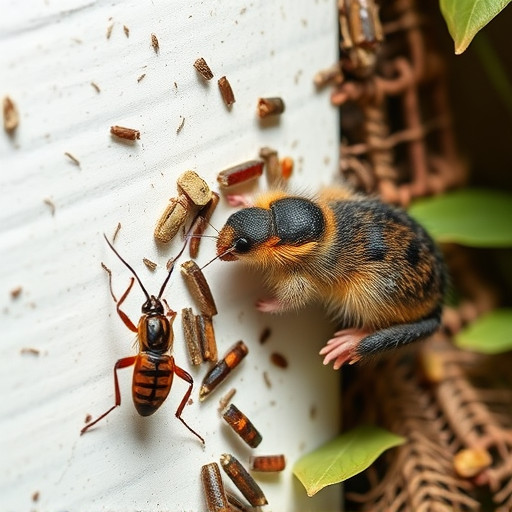Professional Pest Control Services play a critical role in safeguarding both residential and commercial environments against the health risks associated with pests such as Lyme disease, salmonella, and hantavirus. These services employ advanced, eco-friendly methods like Integrated Pest Management (IPM) to effectively manage pests sustainably without compromising safety. IPM focuses on understanding pest behaviors, life cycles, and habitats to implement targeted, preventive strategies that are environmentally responsible and minimize the use of chemical treatments. Regular inspections and treatments by certified professionals ensure early detection and resolution of potential health threats, maintaining clean and safe living or working conditions. Pest Control Services also adhere to regulatory standards, utilizing cutting-edge technologies for precise treatment applications and advanced monitoring devices to optimize pest management outcomes. By combining professional expertise with homeowner DIY practices, year-round pest management can effectively prevent and control infestations, ensuring that homes remain pest-free while prioritizing health, safety, and environmental conservation.
Protecting one’s health encompasses a multifaceted approach, one critical aspect being the management of pests. This article delves into various safe and effective treatment methods to safeguard your well-being against the threats posed by invasive species. We explore the necessity of pest control services in maintaining public health, introduce Integrated Pest Management (IPM) as a sustainable strategy, and highlight biological and natural methods suitable for homeowners. Additionally, we examine the role of professional services in ensuring compliance with safety standards and provide insights into modern pest control techniques. Finally, we offer DIY strategies to help you fortify your living space against unwanted intruders, all aimed at promoting a healthy and safe environment for you and your loved ones.
- Understanding the Necessity of Pest Control Services for Health Protection
- Integrated Pest Management (IPM): A Sustainable Approach to Pest Control
- Biological and Natural Pest Control Methods for Homeowners
- The Role of Professional Pest Control Services in Public Health
- Modern Techniques in Pest Control: Safety, Efficacy, and Regulatory Compliance
- DIY Pest Prevention Strategies to Safeguard Your Living Space
Understanding the Necessity of Pest Control Services for Health Protection
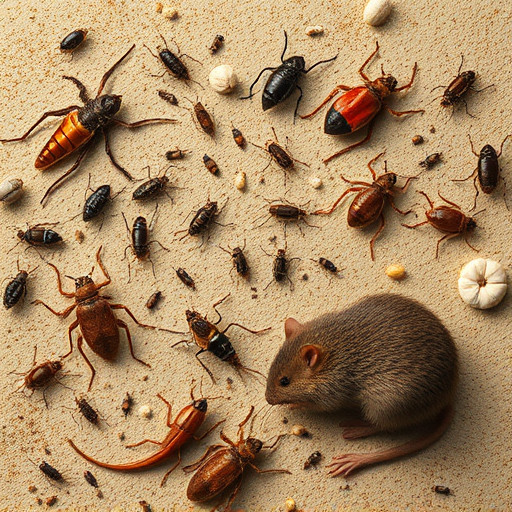
The proliferation of pests in residential and commercial environments poses significant health risks that necessitate the expertise of professional Pest Control Services. These pests, including rodents, insects, and other vermin, can carry pathogens responsible for diseases like Lyme disease, salmonella, and hantavirus. Their presence isn’t merely a nuisance; it’s a potential health hazard that requires immediate attention. Professional Pest Control Services are equipped with the latest methods and products to effectively manage and eliminate pests safely. By understanding the behavior and habitats of these creatures, these services can implement targeted strategies that prevent infestations, thereby safeguarding public health. Regular inspections and treatments by professionals ensure that potential issues are addressed before they escalate into bigger problems, thus maintaining a healthy living or working environment. It’s imperative to recognize the importance of ongoing pest management as part of a comprehensive health protection strategy, making Pest Control Services an indispensable ally in the defense against pests.
Integrated Pest Management (IPM): A Sustainable Approach to Pest Control
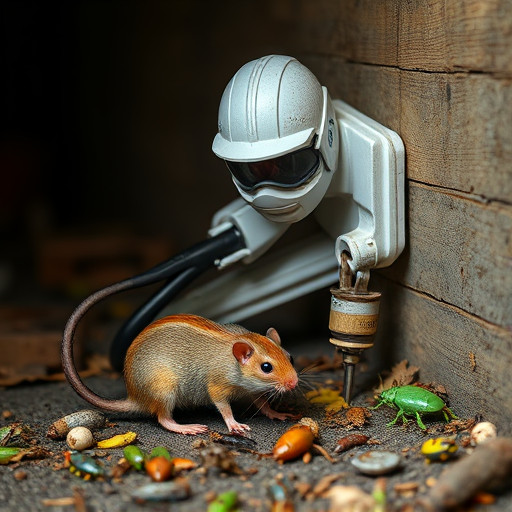
Integrated Pest Management, or IPM, represents a sustainable and environmentally friendly approach to managing pests. Unlike traditional pest control methods that often rely on chemical treatments, IPM focuses on long-term prevention and protection strategies. This holistic method employs a combination of techniques, including biological pest control, habitat manipulation, and the judicious use of pesticides as a last resort. By understanding the life cycle of pests and their behavior, pest control services can implement IPM to create an effective barrier against infestations. This approach not only safeguards health by reducing exposure to harmful chemicals but also preserves the ecosystem by minimizing the impact on non-target organisms. The benefits of IPM extend beyond immediate pest control; it promotes biodiversity, conserves natural resources, and contributes to the overall sustainability of agricultural practices and urban landscapes alike. In adopting IPM, individuals and communities can enjoy a safer living environment while supporting the health of the planet.
Biological and Natural Pest Control Methods for Homeowners
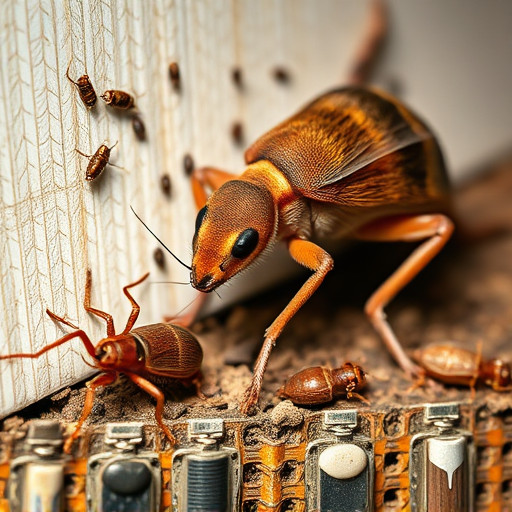
Integrating biological and natural pest control methods into home maintenance is a prudent approach for safeguarding health while managing pests effectively. Unlike conventional pesticides, these methods harness the natural predation dynamics of insects and other pests. For instance, introducing beneficial insects such as ladybugs or lacewings can significantly reduce aphid populations on garden plants without posing risks to humans, pets, or non-target organisms. These natural pest control services act as a first line of defense, often deterring or controlling pests before they become a problem. Additionally, strategic placement of diatomaceous earth or insect-specific neem oil treatments can offer long-lasting protection by physically damaging the exoskeletons of pests or disrupting their reproductive cycles. These environmentally friendly options are particularly beneficial for households with children and pets, ensuring a safe living environment while effectively managing pest populations. Homeowners should consider partnering with professional pest control services to design and implement a tailored pest management plan that aligns with their specific needs and the unique ecology of their home environment. These experts can provide guidance on the most suitable biological or natural treatments, ensuring that pests are kept at bay in an eco-conscious manner.
The Role of Professional Pest Control Services in Public Health
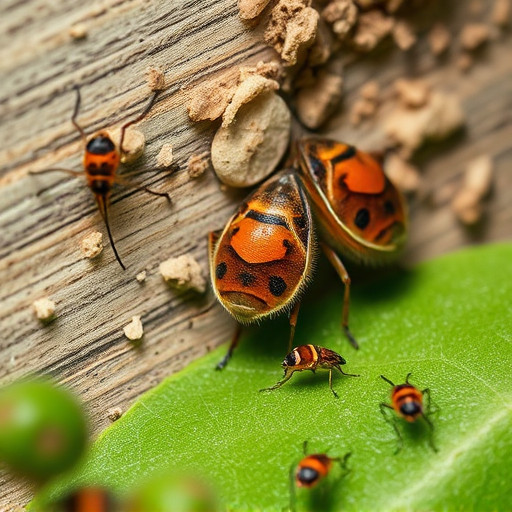
Integrated pest management (IPM) strategies employed by professional pest control services play a pivotal role in safeguarding public health. These services not only target the elimination of pests but also focus on preventing their infestation through environmentally sound and sustainable practices. By identifying and monitoring pest populations, these professionals can implement timely interventions that effectively reduce the risk of disease transmission associated with pests such as rodents, cockroaches, and flies. Moreover, they utilize a combination of mechanisms, including the use of eco-friendly materials and biological controls, to manage pest populations without posing risks to human health or the environment. This proactive approach ensures that potential health hazards are minimized, thereby contributing significantly to the overall well-being of communities.
The effectiveness of professional pest control services in public health is evident in their ability to address both the immediate and long-term challenges of pest management. Regular inspections and treatments by certified pest control operators (PCOs) help in maintaining consistent standards of cleanliness and safety, particularly in food handling and healthcare settings where the risk of pest-related health issues is heightened. By adhering to regulatory guidelines and employing advanced techniques, these services not only protect against structural damage caused by pests but also prevent the spread of pathogens that can lead to outbreaks of diseases such as Lyme disease, salmonella, and hantavirus. The role of professional pest control in public health is undeniable, making it an indispensable component of comprehensive health maintenance strategies.
Modern Techniques in Pest Control: Safety, Efficacy, and Regulatory Compliance
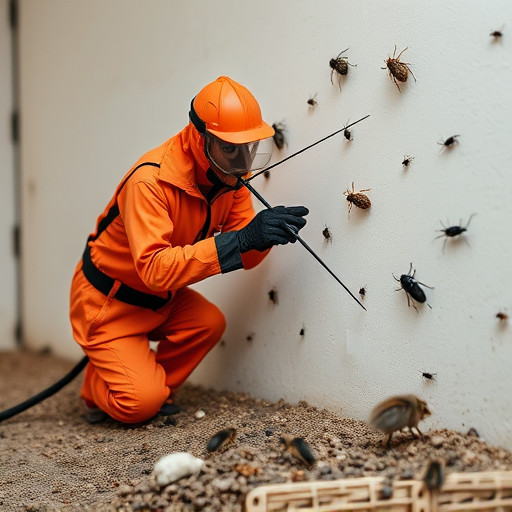
In recent years, advancements in pest control services have significantly enhanced both the safety and efficacy of treatments for infestations. Modern techniques employ a combination of Integrated Pest Management (IPM) strategies and innovative technologies that not only address the immediate concern but also ensure long-term pest prevention. These methods are designed to minimize environmental impact, reduce the use of harmful chemicals, and safeguard human health. Regulatory bodies worldwide set stringent standards for pest control treatments, necessitating compliance with safety protocols and efficacy benchmarks. Professional pest control services adhere to these guidelines, utilizing eco-friendly solutions such as bait stations, traps, and biological pesticides that are targeted and less disruptive to non-target species. The integration of monitoring devices and data analysis allows for precise application of treatments, further reducing the risk of exposure to harmful substances. This proactive approach ensures that homes, businesses, and public spaces remain free from pests while adhering to the highest safety and environmental standards.
The effectiveness of modern pest control services is evident in their ability to manage a wide array of pests, from rodents and insects to birds and larger mammals. These services often combine exclusion methods with mechanical and chemical controls tailored to the specific pest and its behavior patterns. Regular inspections and maintenance are crucial for ongoing protection, ensuring that any emerging issues are promptly identified and addressed. With a focus on continuous improvement and adherence to regulatory compliance, these pest control services offer a reliable shield against infestations, preserving health and property integrity with minimal environmental footprint.
DIY Pest Prevention Strategies to Safeguard Your Living Space
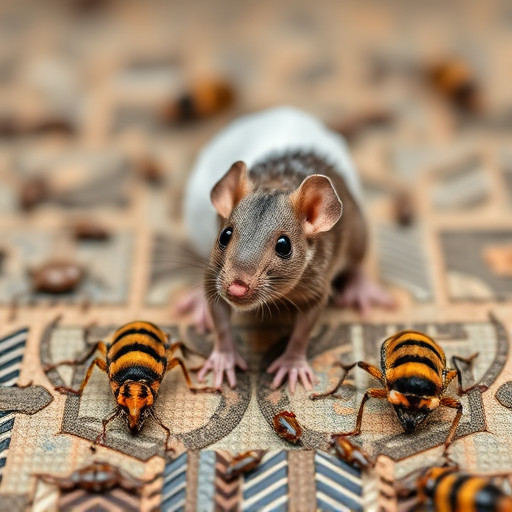
Combating pests in your living space is a year-round endeavor that can be approached with both proactive DIY strategies and professional pest control services when necessary. One effective method to safeguard your home from unwanted guests is maintaining cleanliness, as pests like ants, cockroaches, and rodents are often drawn to food scraps and crumbs. Regularly vacuuming, washing dishes promptly, and storing food in airtight containers can significantly reduce the risk of infestation. Additionally, sealing potential entry points, such as gaps around pipes or windows, with caulk or steel wool can prevent pests from entering your home.
If you suspect an infestation or notice signs like droppings or damage to property, it’s advisable to enlist the expertise of professional pest control services. These experts have the knowledge and tools to identify the specific pest, assess the situation, and implement a tailored treatment plan that may include baiting, trapping, or exclusion methods. They can also provide advice on long-term strategies to keep your living space pest-free, ensuring the health and safety of your home environment. Regular inspections and preventative measures are key; however, when professional intervention is required, pest control services offer solutions that are both effective and safe for your family and pets.
In conclusion, maintaining a pest-free environment is a cornerstone of safeguarding personal and public health. The array of safe and effective treatment methods available, from Integrated Pest Management (IPM) to biological controls, underscores the importance of informed choices in pest control services. Homeowners and professionals alike must prioritize sustainable practices that adhere to safety, efficacy, and regulatory standards. By integrating both professional pest control services and DIY preventive strategies, we can effectively shield our living spaces from the threats posed by unwanted pests. It is through this concerted effort that we can ensure a healthy and secure environment for all.
